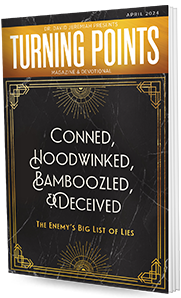From the August 2022 Issue

Online Exclusive: From This Point Forward
Sticks & Stones
The respected author, Gordon MacDonald, tells how a rebuke from a friend saved him thousands of times over—from hurting others and making a fool of himself. He was in Japan on (ironically) a speaking tour with a close personal friend of his, a man several years his senior. As he and his friend were walking down a street in Yokohama, the name of one of their mutual friends came up. And Gordon said something unkind about the person: “It was sarcastic. It was cynical. It was a put-down,” he recalls.
His friend stopped immediately and put his face right in front of Gordon's and said, “Gordon, a man who says he loves God would not say a thing like that about a friend.” In the midst of a speaking tour about God, he had used ungodly words to belittle another person.
“[My friend] could have put a knife into my ribs, and the pain would not have been any less,” Gordon wrote later. “But you know something? There have been ten thousand times in the last 20 years that I have been saved from making a jerk of myself. When I've been tempted to say something unkind about a brother or sister, I hear my friend's voice say, ‘Gordon, a man who says he loves God would not speak in such a way about a friend.’”1
There must have been a good reason for the origin of this saying—"Sticks and stones may break my bones, but words can never harm me”—but here I have to disagree! Words can hurt as much, if not more, than “sticks and stones.”
Think what would have happened to Gordon MacDonald's relationship with the person he spoke ill of if Gordon's unkind words had made it back to the person! Think how Gordon’s reputation would have been hurt as well. And think about your own experience. Every single person who will read this article has been hurt by someone else’s words. And sad to say, each of us has probably been guilty of speaking hurtful words as well.
Angry Birds, Angry Words
Yes, it’s a cartoon that we say we don’t take seriously. But when the timbers and stones come crashing down on the pigs in “Angry Birds,” there's pain implied. Seeing the implied pain of “sticks and stones” and hearing painful words spoken in films and television shows—without feeling that pain ourselves—desensitizes us just a little bit more to the reality of pain regardless of the cause.
In real life there's no director who yells “Cut!” at the end of a scene and erases the seriousness of painful words just spoken by actors. In real life, the words hurt, and the pain lingers. And once the words are spoken, there’s no getting them back.
The story is told of a monk who was training a young candidate. He told the young man to take a bag of feathers and go around the village and leave a feather on every doorstep, which the young man did. The next day, the monk told the young candidate to take his empty sack and retrieve all the feathers he had left on the doorsteps. Shocked at these instructions, the young man said, “But that's impossible! The wind will have scattered the feathers far and wide. I will never be able to find them.”
“You’re right,” the monk said. “Understand that your words are like those feathers. Once released, they are impossible to bring back. So be careful when you speak.”
Let us not be desensitized and careless about the words we speak—especially when the emotion of anger wells up from within. It is no wonder that the apostle James combined “slow to speak” and “slow to wrath” in the same verse (James 1:19).
Portraying the Tongue
Thankfully, there is no shortage of guidance in Scripture about the power of words. And nobody summarized the danger of the tongue better than the apostle James (James 3:1-12).
Accountability. James warns teachers to be careful what they say because there is judgment involved (James 3:1). But that’s also true for everyone. Jesus said that we will be held accountable for “every idle word” we speak (Matthew 12:36)—meaning the words we speak without thinking and the words we think are innocent. The most casual, thoughtless words can sometimes hurt the most. Proverbs 10:19 says that “he who restrains his lips is wise” because “in the multitude of words sin is not lacking.” It’s just a matter of math: the more words a person with a fallen nature speaks, the greater the likelihood that some of them will be regrettable.
Disproportionality. That’s a big word to express a simple idea: The size of the tongue, or the size of a few simple words, are in stark contrast to the size of the trouble caused (James 3:36). A small bit can guide a horse and a rudder can turn a giant ship. And a small word can shape the entire course of a person’s life. How often do we hear reports of a politician or celebrity being caught near a “hot mic”—a microphone they had just used to deliver an inspiring speech, a mic which they thought had been turned off. Some distasteful or derogatory comment is captured by the microphone and gets broadcast to the whole world via the Internet. All the good accomplished in the speech is undone by the unguarded word(s). (But there is a positive side of disproportionality too. Just as a single unkind or unguarded word can hurt, a single kind or complimentary word can heal. Disproportionality works both ways.)
Wildness. The tongue is not like the sweet kitty or puppy that greets you when you walk through the door. The tongue is like a saber-tooth tiger or a ravenous wolf (James 3:7-8). Man has succeeded in taming some of the wildest creatures on earth, but has failed miserably when it comes to taming the tongue. Evidence? How many times have you thought, “I wish I’d never said that!”? There’s the proof—the tongue does what it wants and must be kept on a short leash. (More on the reason for that below.)
Consistency. Remember what Gordon MacDonald's friend said to him? “A man who says he loves God would not say a thing like that about a friend.” For a man or woman of God to speak in an ungodly way is inconsistent at best and hypocritical at worst. James says that blessings and curses should not come from the same mouth any more than salt water and fresh water can come from the same spring (James 3:9-12).
James also says: Remember you are accountable; remember what words are capable of; remember how wild words are; remember that curses can cancel out blessings.
Protecting the Tongue
There is only one way to protect the tongue: Protect the heart. Proverbs 4:23 calls the heart the “wellspring of life (NIV 1984). Jesus said that all the things that defile a person spring from the person's heart including verbal sins like slander—speaking ill of someone (Mark 7:20-23). We can polish our exterior all we want, but eventually the heart of a person will reveal what the person is really like. That was the problem Jesus had with the Pharisees. They looked great on the outside, but they were like nicely painted sepulchers full of dead men's bones (Matthew 23:27). The mouth only speaks what the heart gives it to say. If you are tempted—especially in emotional or angry moments—to speak words that you later regret, ask God to search your heart and show you what’s really there (Psalm 139:23-24).
Yes, sticks and stones can break a person’s bones. So we want to avoid those at all costs. But it is not true that “words can never harm.” They can and will if we don't allow the Spirit of Christ to guard our hearts. Purpose today to let the words of your mouth and the meditation of your heart be acceptable to God (Psalm 19:14).
Sources:
1Gordon MacDonald, “Feeling As God Feels,” Preaching Today, #196.
More Articles
This Month's Magazine Resource

Victorious
How can we prepare for spiritual warfare—the trials and tribulations and disruptions in our spiritual lives that so often affect who we are and what we do—and how can we win the battle? Victorious is designed to help you enjoy a victorious life despite what may be going on in the world or in your life at any given moment.
Subscribe Now
Each month, read articles and devotionals from Dr. David Jeremiah that will encourage, challenge, and strengthen your walk with the Lord.




















